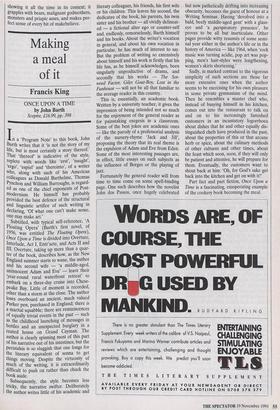Making a meal of it
Francis King
ONCE UPON A TIME by John Barth Sceptre, £16.99, pp. 398 by John Barth Sceptre, £16.99, pp. 398 n a 'Program Note' to this book, John Barth writes that it 'is not the story of my life, but is most certainly a story thereof.' That `thereof is indicative of the style, replete with words like 'erst', 'naught', ergo', 'espiel' and 'thereinto', of a writer Who, along with such of his American colleagues as Donald Barthelme, Thomas Pynchon and William Burroughs, is regard- ed as one of the chief exponents of Post- modernism. He himself has probably provided the best defence of the structural and linguistic artifice of such writing in declaring, 'Of what one can't make sense, one may make art.' Subtitled, with typical self-reference, 'A Floating Opera' (Barth's first novel, of 1956, was entitled The Floating Opera), Once Upon a Time is divided into Overture, Interlude, Act I, Entr'acte, and Acts II and III. Overture, taking up more than a quar- ter of the book, describes how, as the New England summer starts to wane, the author and his second wife — 'a middle-aged, uninnocent Adam and Eve' — leave their year-round rural waterfront retreat' to embark on a three-day cruise into Chese- peake Bay. Little of moment is recorded, other than a storm at the close. The author loses overboard an ancient, much valued Parker pen, purchased in England; there is a marital squabble; there are reminiscences of equally trivial events in the past — such as the childhood launching of messages in bottles and an unexpected burglary in a rented house on Grand Cayman. The author is clearly spinning most of this part of his narrative out of his intestines; but the peristalsis is so sluggish that one longs for the literary equivalent of serum to get things moving. Despite the virtuosity of much of the writing, it is extraordinarily difficult to push on rather than chuck the book aside.
Subsequently, the style becomes less tricky, the narrative swifter. Deliberately the author writes little of his academic and
I
literary colleagues, his friends, his first wife or his children. This leaves his second, the dedicatee of the book, his parents, his twin sister and his brother — all vividly delineat- ed — a fictional alter ego or counter-self and, endlessly, remorselessly, Barth himself and his books. About the writer's vocation in general, and about his own vocation in particular, he has much of interest to say. But the problem of writing so extensively about himself and his work is firstly that his life has, as he himself acknowledges, been singularly unproductive of drama, and secondly that his works — The Sot- weed Factor, Giles Goat-Boy, Lost in the Funhouse — will not be all that familiar to the average reader in this country.
This is, essentially, an academic book. Written by a university teacher, it gives the impression of being intended not so much for the enjoyment of the general reader as for painstaking exegesis in a classroom. Some of the best jokes are academic ones — like the parody of a professorial analysis of the nursery-rhyme 'Jack and Jill', proposing the theory that its real theme is the expulsion of Adam and Eve from Eden. Some of the most interesting passages are, in effect, little essays on such subjects as the influence of Borges or the playing of jazz.
Fortunately the general reader will from time to time come on some spell-binding page. One such describes how the novelist John dos Passos, once hugely celebrated but now pathetically drifting into increasing obscurity, becomes the guest of honour at a Writing Seminar. Having 'devolved into a bald, beefy middle-aged gent' with a glass- eye and 'a perspiratory presence', he proves to be all but inarticulate. Other pages provide witty resumes of some semi- nal year either in the author's life or in the history of America — like 1964, when 'rock music was turning acidic, pop art was pop- ping, men's hair-styles were lengthening, women's skirts shortening.'
Sadly, in marked contrast to the vigorous simplicity of such sections are those far more extensive ones when the author seems to be exercising for his own pleasure in some private gymnasium of the mind. Then he resembles a master chef who, instead of busying himself in his kitchen, comes out into the restaurant to talk on and on to his increasingly famished customers in an incantatory logorrhoea about dishes that he and other equally dis- tinguished chefs have produced in the past, about the properties of this or that arcane herb or spice, about the culinary methods of other cultures and other times, about the feast which soon, soon, if they will only be patient and attentive, he will prepare for them. Eventually, the customers want to shout back at him: 'Oh, for God's sake get back into the kitchen and get on with it!'
Part fact and part fiction, Once Upon a Time is a fascinating, exasperating example of the cookery book becoming the meal.


















































































 Previous page
Previous page